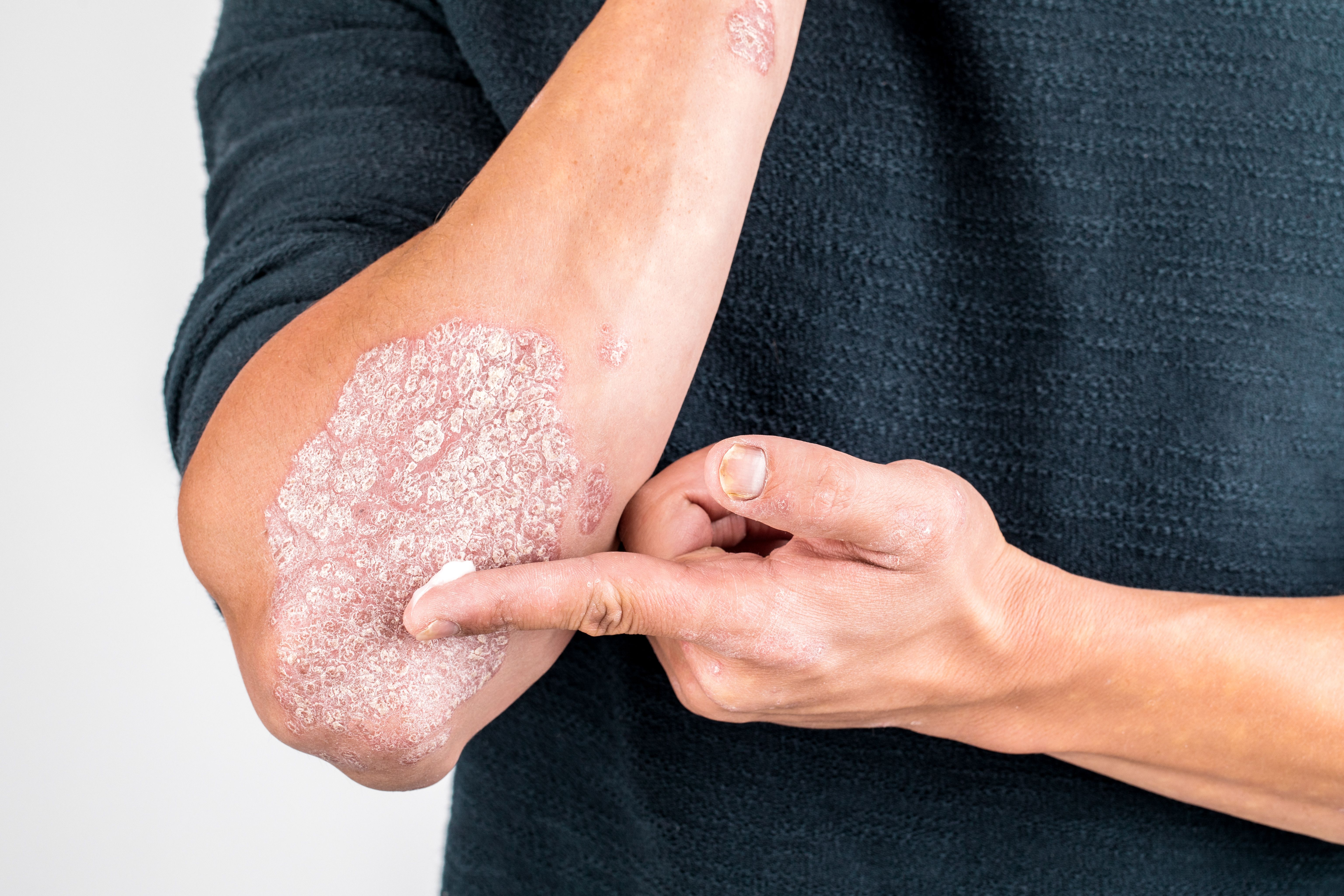- Case-Based Roundtable
- General Dermatology
- Eczema
- Chronic Hand Eczema
- Alopecia
- Aesthetics
- Vitiligo
- COVID-19
- Actinic Keratosis
- Precision Medicine and Biologics
- Rare Disease
- Wound Care
- Rosacea
- Psoriasis
- Psoriatic Arthritis
- Atopic Dermatitis
- Melasma
- NP and PA
- Skin Cancer
- Hidradenitis Suppurativa
- Drug Watch
- Pigmentary Disorders
- Acne
- Pediatric Dermatology
- Practice Management
- Prurigo Nodularis
- Buy-and-Bill
Video
Plaque Psoriasis Case 1: Patient Counseling and Approaching Therapy
Author(s):
Centering discussion on a case of plaque psoriasis, experts share their experience with patient counseling and selecting therapy.
Transcript:
Christopher G. Bunick, MD, PhD: Our first patient case is a 50-year-old who has plaque psoriasis. They don’t have any joint involvement, but the plaque psoriasis covers their upper and lower extremities and back. Approximately 30% to 40% of the body surface area is affected. This patient has used topical corticosteroids, topical calcineurin inhibitors, and topical calcipotriene with very limited success. Dr Wu, I’d like to turn to you to start. How would you deal with a patient like this? What would be the first thing you would counsel them on?
Jashin Wu, MD: First, I’d ask them how this disease is affecting them. Because as you mentioned before, they sometimes may have severe psoriasis on their whole body, but they might actually not be bothered by it that much. Or on the flip side, this patient may say, “It’s the most terrible thing I’ve ever experienced, and I really want to treat it as soon as possible.” I want to get a sense of how much this is affecting them.
But in general, I’d suspect that it’s affecting them pretty severely overall, both physically and mentally, in which case I’d usually recommend something systemic. Obviously, they’ve failed multiple topical agents already. For someone like this, I’d favor one of the biologic agents, probably an interleukin-23 [IL-23] inhibitor. I usually like to start with an interleukin-23 inhibitor if they don’t have joint involvement, mostly because of the better, longer-lasting dosing of every 8 weeks, and the maintenance dosing of every 12 weeks. That’s what I usually prefer for these patients. They don’t necessarily want to have multiple shots, especially in the beginning when they may have multiple shots in the loading phase.
Christopher G. Bunick, MD, PhD: Let me follow that up, Dr Wu. Let’s say the patient comes in. Certainly, your approach with the biologics makes sense. That’s what a lot of dermatologists do. But let’s say the patient tells you, “I’d like to start methotrexate.” What do you tell patients nowadays who have read or heard about methotrexate but may not be familiar with these more advanced biologics?
Jashin Wu, MD: I’d say methotrexate is a good drug for many patients. It’s very cheap. It’s probably the cheapest drug out there if cost is a concern for these patients. But unfortunately, methotrexate has multiple adverse effects. You need to check laboratory tests on a regular basis as well. If they use it for a long time, they may need to get a liver biopsy in some cases. We usually avoid liver biopsies for most cases now. You can do imaging to avoid the liver biopsies, but that’s still a concern. They may have some liver fibrosis. I’d try to mention that they may have a reduction in their blood counts. They may get oral ulcers. By mentioning some of these potential adverse effects, I’m not trying to scare them, but I’m letting them know that this isn’t the best drug in general. I tell them, “If I or one of my family members had psoriasis, I probably wouldn’t be reaching for methotrexate.” I’d be moving on to one of the more advanced agents, such as a biologic agent.
Christopher G. Bunick, MD, PhD: You mentioned something really important: family, “If this were my family.” Following up on Dr Torok’s experience and what she said earlier, I’ve found that sometimes there’s the family test. Imagine the patient is your own family member. What would you do for them? If this was your family member, what would you do? That’s what you should probably do for your patient, because that’s what you’d do for your family. Dr Lebwohl, I’d like to turn to you. What therapy would you initiate in this patient? What considerations would you take in determining the next therapy for a patient like this?
Mark G. Lebwohl, MD: First of all, let me also say that I say that often. “If it were me or a family member, this is what I would take.” I also think if you look at the statistics on methotrexate, it’s quite a toxic drug. In fact, in a study of randomized controlled trials of low-dose methotrexate for rheumatoid arthritis, rheumatologists reported a frequency of pancytopenia or death of 1.4%. That means if you treat 200 patients, almost 3 will have a really bad adverse effect. That’s a real number. So I discourage patients from going on methotrexate. Thankfully, we don’t have to fail methotrexate anymore, unlike the old days where I had to write letter after letter explaining why I didn’t want to use it.
With a patient who has hand and knee arthralgias, knee pain is very common, and it’s commonly osteoarthritis. Hand arthralgias are also commonly psoriatic arthritis. So even though I may not have a formal diagnosis of psoriatic arthritis, this would prompt me to reach for an IL-17 [interleukin-17] blocker. Admittedly, guselkumab, an IL-23 blocker, is approved for psoriatic arthritis and is a great drug. I use a lot of it. But in this particular patient, I’d probably go for an IL-17 blocker, even as a test to see what it does to the patient’s hand pain.
Transcript edited for clarity.






